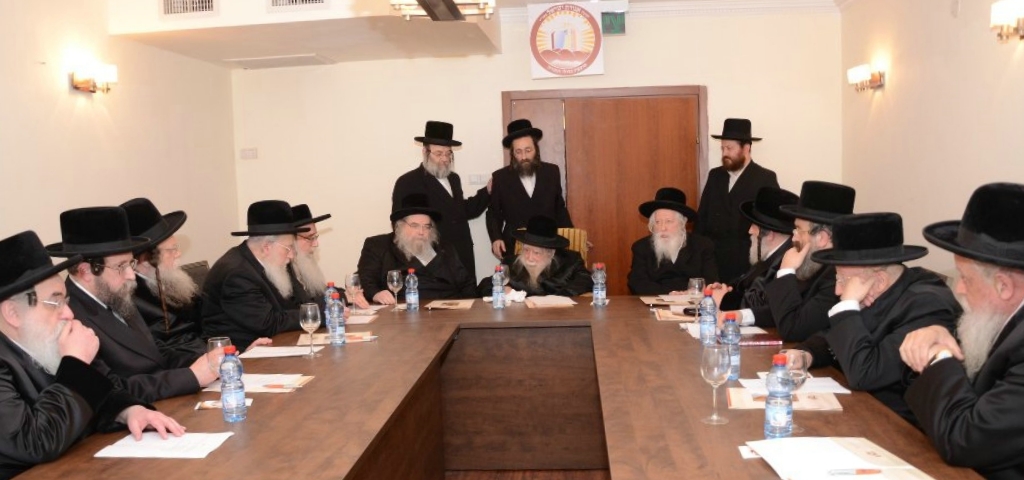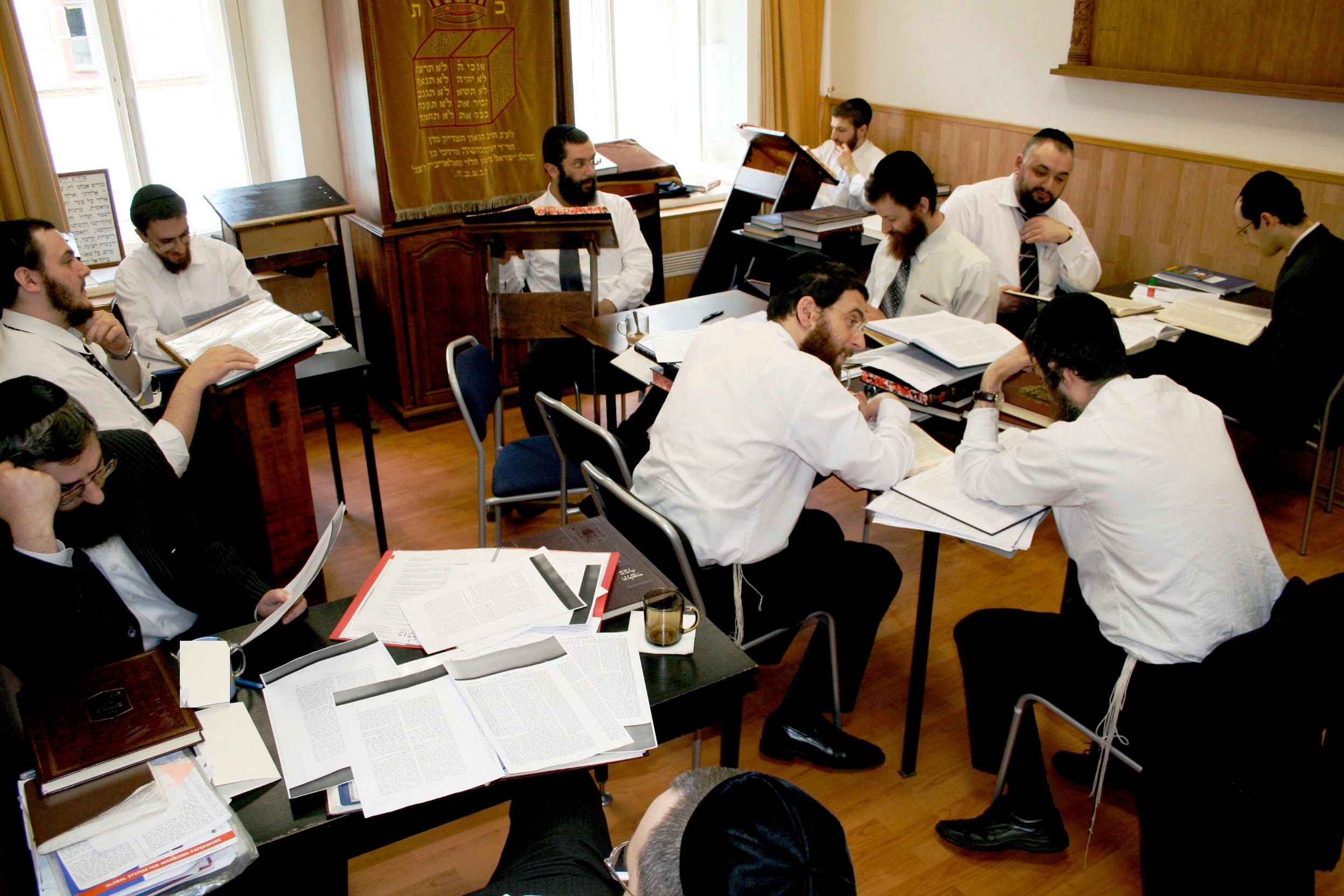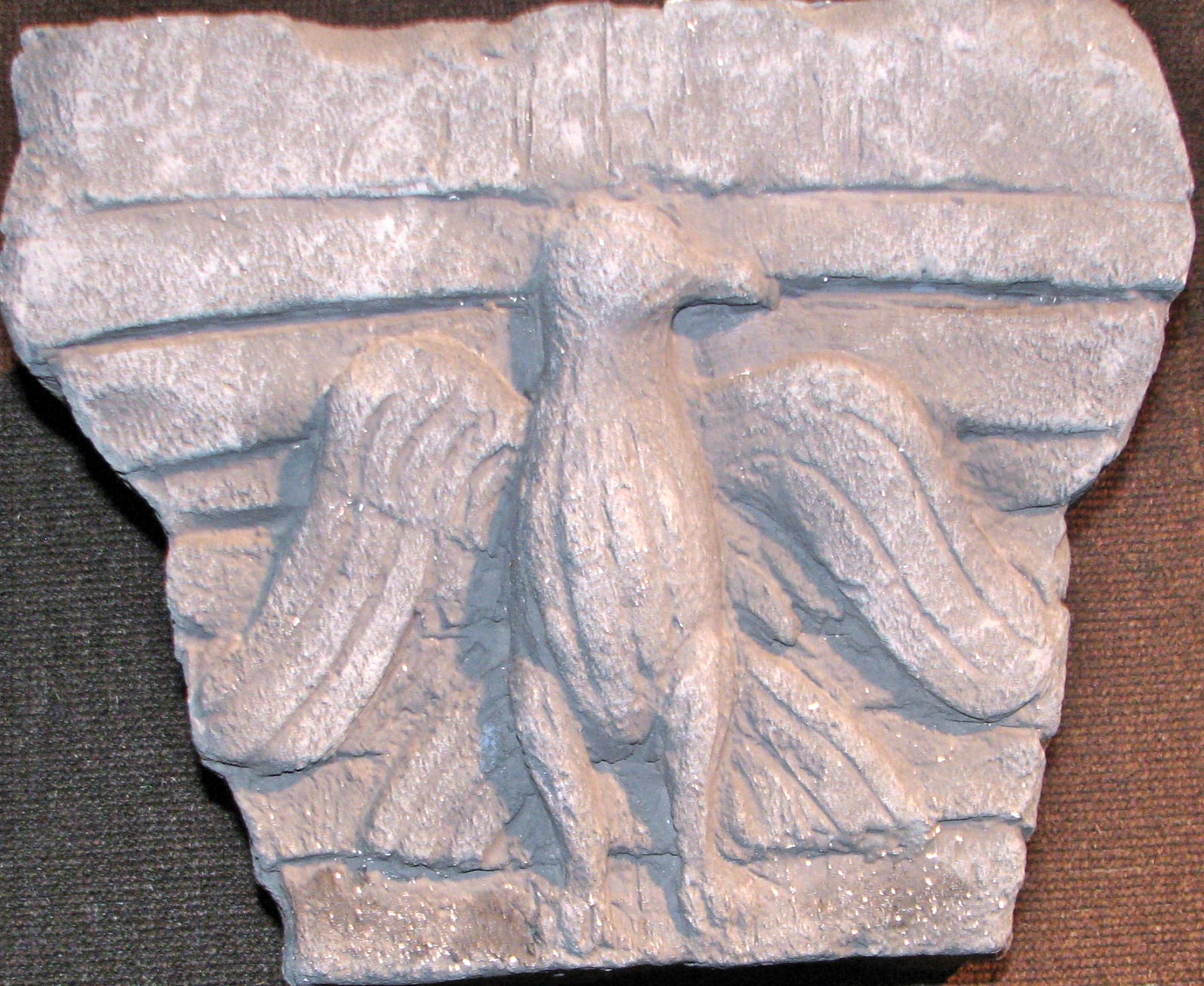|
Yitzchak Yaakov Rabinowitz
Yitzhak Yaakov Rabinovich (1854–1919), , known also as reb Itzele Ponevezher, was an Orthodox rabbi, supporter of socialist ideas and founder of the Ponevezh Yeshiva. Biography Yitzhak Yaakov Rabinovich was born in 1854 in Shereshevo, Belorussia in a wealth family of merchant. He received private education of Talmud and at the age of 14 moved out of home to Selets in order to study with Yeruham Perlman — who later became noted rabbi of Minsk. A few years later Rabinovich, together with Chaim Soloveitchik moved to Brest-Litovsk. While studying together two of them developed new method of studying Talmud: by logic and deep understanding of text - in contrast to the previously long-used method of ''pilpul'' (casuistry). In 1889, Rabinovich was appointed a teacher at the Slobodka yeshiva. However, due to challenges in accepting Musar ideology that the school followed, he left in 1894 and became a rabbi in Gorzd, Lithuania. Two years later (in 1896) he has settled in Poneve ... [...More Info...] [...Related Items...] OR: [Wikipedia] [Google] [Baidu] |
Ponevezh Yeshiva
Ponevezh Yeshiva, often pronounced as Ponevitch Yeshiva ( he, ישיבת פוניבז׳), is a yeshiva founded in 1908, and located in Bnei Brak, Israel since 1944. The yeshiva has over three thousand students, including those of affiliated institutions, and is considered one of the leading Litvish yeshivas in Israel. History Founded in 1908, the yeshiva was originally located in city of Panevėžys (Ponevezh), Lithuania prior to the Holocaust. After the death of its founder, Rabbi Yitzhak Yaakov Rabinovich, the yeshiva was re-established in Bnei Brak in 1944 by Rabbi Yosef Shlomo Kahaneman, who was residing in British Mandate of Palestine at the time. Kahaneman appointed Rabbi Shmuel Rozovsky as dean, and some years later appointed Rabbi Dovid Povarsky as ''rosh yeshiva''. The Kahaneman faction of the yeshiva is led by Rabbi Gershon Eidelstein and Rabbi Berel Povarsky, son of Rabbi Dovid Povarsky, and Rabbi Chaim Peretz Berman, a grandson of The Steipler, and a son-in-law of ... [...More Info...] [...Related Items...] OR: [Wikipedia] [Google] [Baidu] |
Gargždai
Gargždai () is a city in western Lithuania located in Klaipėda County. The Minija River flows through the city.John S. Jaffer ShtetLinks: Gargzdai (Gorzd), LithuaniaJewishGen, Inc., the Home of Jewish Genealogy. Accessed June 18, 2011. Gargždai Stadium is its main sports venue. Gargždai is the Lithuanian name of the city. Versions of the name in other languages include Polish: ''Gorżdy'', Russian: Горжды ''Gorzhdy'', Belarusian: Го́ржды ''Horzhdy'', Yiddish: גורזד ''Gorzhd'', German: ''Garsden''. The Holocaust The number of Jewish residents of Gargzdai killed by the Nazi ''Einsatzkommando'' death squad during the Holocaust is at least 500 including 200 men killed on June 24, 1941, and 300 women with children killed on September 14 and 16, 1941. The killings were perpetrated by Einsatzgruppe A under the command of SS Brigadeführer Walter Stahlecker, and documented in the Jäger report. International relations In 2015 the development of Gargzdai Indust ... [...More Info...] [...Related Items...] OR: [Wikipedia] [Google] [Baidu] |
Critique Of Political Economy
Critique of political economy or critique of economy is a form of social critique that rejects the various social categories and structures that constitute the mainstream discourse concerning the forms and modalities of resource allocation and income distribution in the economy. The critique also rejects economists' use of what its advocates believe are unrealistic axioms, faulty historical assumptions, and the normative use of various descriptive narratives. They reject what they describe as mainstream economists' tendency to posit the economy as an a priori societal category. Those who engage in critique of economy tend to reject the view that the economy, and its categories, is to be understood as something transhistorical. They rather argue that it is a relatively new mode of resource distribution, which emerged along with modernity. Hence, it is seen as merely one of many types of historically specific ways to distribute resources. Critics of economy critique the given ... [...More Info...] [...Related Items...] OR: [Wikipedia] [Google] [Baidu] |
Agudat Israel
Agudat Yisrael ( he, אֲגוּדָּת יִשְׂרָאֵל, lit., ''Union of Israel'', also transliterated ''Agudath Israel'', or, in Yiddish, ''Agudas Yisroel'') is a Haredi Jewish political party in Israel. It began as a political party representing Haredi Jews in Poland, originating in the Agudath Israel movement in Upper Silesia. It later became the Party of many Haredim in Israel. It was the umbrella party for many, though not all, Haredi Jews in Israel until the 1980s, as it had been during the British Mandate of Palestine. Since the 1980s, it has become a predominantly Hasidic party, though it often combines with the Degel HaTorah non-Hasidic Ashkenazi Haredi party for elections and coalition-forming (although not with the Sephardi and Mizrahi Haredi party Shas). When so combined, they are known together as United Torah Judaism. History When political Zionism began to emerge in the 1890s, and recruit supporters in Europe and America, it was opposed by many Orthodox ... [...More Info...] [...Related Items...] OR: [Wikipedia] [Google] [Baidu] |
Saint Petersburg
Saint Petersburg ( rus, links=no, Санкт-Петербург, a=Ru-Sankt Peterburg Leningrad Petrograd Piter.ogg, r=Sankt-Peterburg, p=ˈsankt pʲɪtʲɪrˈburk), formerly known as Petrograd (1914–1924) and later Leningrad (1924–1991), is the second-largest city in Russia. It is situated on the Neva River, at the head of the Gulf of Finland on the Baltic Sea, with a population of roughly 5.4 million residents. Saint Petersburg is the fourth-most populous city in Europe after Istanbul, Moscow and London, the most populous city on the Baltic Sea, and the world's northernmost city of more than 1 million residents. As Russia's Imperial capital, and a historically strategic port, it is governed as a federal city. The city was founded by Tsar Peter the Great on 27 May 1703 on the site of a captured Swedish fortress, and was named after apostle Saint Peter. In Russia, Saint Petersburg is historically and culturally associated with t ... [...More Info...] [...Related Items...] OR: [Wikipedia] [Google] [Baidu] |
Rabbinical Congress
Rabbinic Judaism ( he, יהדות רבנית, Yahadut Rabanit), also called Rabbinism, Rabbinicism, or Judaism espoused by the Rabbanites, has been the mainstream form of Judaism since the 6th century CE, after the codification of the Babylonian Talmud. Rabbinic Judaism has its roots in Pharisaic Judaism and is based on the belief that Moses at Mount Sinai received both the Written Torah (''Torah she-be-Khetav'') and the Oral Torah (''Torah she-be-al Peh'') from God. The Oral Torah, transmitted orally, explains the Written Torah. At first, it was forbidden to write down the Oral Torah because the rabbis feared that it would become rigid and lose its flexibility, but after the destruction of the Second Temple they decided to write it down in the Talmud and other rabbinic texts. Rabbinic Judaism contrasts with the Sadducees, Karaite Judaism and Samaritanism, which do not recognize the Oral Torah as a divine authority nor the rabbinic procedures used to interpret Jewish scripture. ... [...More Info...] [...Related Items...] OR: [Wikipedia] [Google] [Baidu] |
Ponevezh Yeshiva
Ponevezh Yeshiva, often pronounced as Ponevitch Yeshiva ( he, ישיבת פוניבז׳), is a yeshiva founded in 1908, and located in Bnei Brak, Israel since 1944. The yeshiva has over three thousand students, including those of affiliated institutions, and is considered one of the leading Litvish yeshivas in Israel. History Founded in 1908, the yeshiva was originally located in city of Panevėžys (Ponevezh), Lithuania prior to the Holocaust. After the death of its founder, Rabbi Yitzhak Yaakov Rabinovich, the yeshiva was re-established in Bnei Brak in 1944 by Rabbi Yosef Shlomo Kahaneman, who was residing in British Mandate of Palestine at the time. Kahaneman appointed Rabbi Shmuel Rozovsky as dean, and some years later appointed Rabbi Dovid Povarsky as ''rosh yeshiva''. The Kahaneman faction of the yeshiva is led by Rabbi Gershon Eidelstein and Rabbi Berel Povarsky, son of Rabbi Dovid Povarsky, and Rabbi Chaim Peretz Berman, a grandson of The Steipler, and a son-in-law of ... [...More Info...] [...Related Items...] OR: [Wikipedia] [Google] [Baidu] |
Yeshiva
A yeshiva (; he, ישיבה, , sitting; pl. , or ) is a traditional Jewish educational institution focused on the study of Rabbinic literature, primarily the Talmud and halacha (Jewish law), while Torah and Jewish philosophy are studied in parallel. The studying is usually done through daily ''shiurim'' (lectures or classes) as well as in study pairs called '' chavrusas'' (Aramaic for 'friendship' or 'companionship'). ''Chavrusa''-style learning is one of the unique features of the yeshiva. In the United States and Israel, different levels of yeshiva education have different names. In the United States, elementary-school students enroll in a ''cheder'', post- bar mitzvah-age students learn in a ''metivta'', and undergraduate-level students learn in a ''beit midrash'' or ''yeshiva gedola'' ( he, ישיבה גדולה, , large yeshiva' or 'great yeshiva). In Israel, elementary-school students enroll in a ''Talmud Torah'' or ''cheder'', post-bar mitzvah-age students l ... [...More Info...] [...Related Items...] OR: [Wikipedia] [Google] [Baidu] |
Kollel
A kollel ( he, כולל, , , a "gathering" or "collection" f scholars is an institute for full-time, advanced study of the Talmud and rabbinic literature. Like a yeshiva, a kollel features shiurim (lectures) and learning ''sedarim'' (sessions); unlike most yeshivot, the student body of a kollel typically consists mostly of married men. A kollel generally pays a regular monthly stipend to its members. History Original sense Originally, the word was used in the sense of "community". Each group of European Jews settling in Israel established their own community with their own support system. Each community was referred to as the "kollel of " to identify the specific community of the Old Yishuv. The overwhelming majority of these Jews were scholars who left their homelands to devote themselves to study Torah and serve God for the rest of their lives. The kollel was the umbrella organization for all their needs. The first examples were Kolel Perushim (students of the Vilna Gaon who ... [...More Info...] [...Related Items...] OR: [Wikipedia] [Google] [Baidu] |
Wissotzky Tea
Wissotzky Tea ( he, תה ויסוצקי) is an international, family-owned tea company based in Israel with offices in London and the United States. It is the leading tea distributor in Israel. Founded in 1849 in Moscow, Russia, it became the largest tea firm in the Russian Empire. By the early 20th century, it was the largest tea manufacturer in the world. It is one of the oldest tea companies in the world. The Wissotzky Tea Company is headed by Shalom Seidler, a descendant of Shimon Zeidler; the latter, related to Wissotzky by marriage, opened the Middle East branch of the company in 1936. The company's headquarters are located in Tel Aviv while production takes place at a factory located in the Galilee; the company employs about 400 workers. The company enjoys a 76% hold in the local market and exports its products worldwide. Wissotzky Tea is distributed in Canada, UK, Australia, Japan and South Korea, Europe, Hungary, Russia, Ukraine and the US kosher market, entering the Unite ... [...More Info...] [...Related Items...] OR: [Wikipedia] [Google] [Baidu] |
Kalonymus Wissotzky
Kalonymos or Kalonymus ( he, קָלוֹנִימוּס ''Qālōnīmūs'') is a prominent Jewish family who lived in Italy, mostly in Lucca and in Rome, which, after the settlement at Mainz and Speyer of several of its members, took during many generations a leading part in the development of Jewish learning in Germany. The family is according to many considered the foundation of Hachmei Provence and the Ashkenazi Hasidim. Name The name should technically be spelled "Kalonymos," as Kalonymus ben Kalonymus and Immanuel the Roman both rhyme it with words ending in "-mos". The name, which occurs in Greece, Italy, and Provence, is of Greek origin; Kalonymos ( grc, Kαλώνυμος) means "good name" and Wolf pointed that it is a translation of the Hebrew "Shem-Tov"; Zunz, that it represented the Latin "Cleonymus". Early history Traces of the family in Italy may be found as early as the second half of the eighth century. As to the date of the settlement of its members in Germany, the ... [...More Info...] [...Related Items...] OR: [Wikipedia] [Google] [Baidu] |






